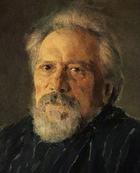
Nikolai Semionovich Leskov was born in Gorojovo, in Central Russia, in 1831. Grandson of a Russian Orthodox priest and nephew of an English Quaker, he was orphaned at the age of sixteen and his inheritance was the creditors' pasture, so he had to earn very soon life and could not do university studies. His work is a great fresco of Russian life in the second half of the nineteenth century. Misunderstood in his time, he would know a great later influence on the Soviet narrative. He worked as a clerk in the criminal court of his city and then as a recruitment agent in Kiev, in whose role he traveled extensively throughout Russia and acquired a first-hand knowledge of the country and its people; He also learned Polish and Ukrainian, and he read a lot, philosophy and economics about everything. In 1853 he married Olga Smirnova, with whom he had two children and from which he separated shortly before moving to St. Petersburg in 1861. It is in this city where he began working as a journalist, initiating a fertile literary career. Famous for his liberal opinions, for which he was dismissed from a civil service post in 1883, he suffered several religious crises, which are reflected in his literary work. Very gifted for the short narrative, owner of an enviable ear, they emphasize in their production titles like Life of a woman of town (1863), or the short novel Lady Macbeth of Mtsensk (1865), that inspired an opera of the same title of Dimitri Shostakovich. The steel flea (1881) is considered the best short piece of Leskov, and one of the heights of nineteenth-century Russian literature. Leskov died in 1895 of a lung cancer, and his remains rest in the courtyard of the poets of Volkovo Cemetery in St. Petersburg. Maximus Gorky considered him "the author most deeply rooted in the popular soul, and freer from foreign influences in the history of Russian literature." Anton Chekhov recognized in Leskov his most genuine teacher.




